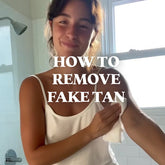Does Hyaluronic Acid Darken Skin? Plus Everything Else You Didn’t Know

Short answer: No, hyaluronic acid does not darken the skin. It does not affect melanin production or skin pigment. Hyaluronic acid is a hydration focused ingredient that supports moisture retention and skin barrier health.
Table of Contents
- Does hyaluronic acid darken skin?
- Why some people think hyaluronic acid darkens skin
- Sunlight and skin darkening
- How hyaluronic acid works on the skin
- How to use hyaluronic acid correctly
- Benefits of hyaluronic acid for all skin tones
- Hyaluronic acid vs other skincare acids
- Hyaluronic acid FAQs
Does hyaluronic acid darken skin?
Hyaluronic acid does not darken skin. It is a clear, colorless humectant that attracts and holds water in the skin. It does not interact with melanin, pigment cells, or natural skin tone. Any appearance of darkening is usually caused by external factors rather than hyaluronic acid itself.
Clearing the Skin Darkening Misconception
One misconception is the idea that hyaluronic acid can darken the skin. In reality, HA is clear and colorless, and it doesn't possess the power to change the skin's color (DermNet NZ), (New Zealand's Dermatological Society).
Why some people think hyaluronic acid darkens skin
Hyaluronic acid is often misunderstood because changes in skin appearance can happen when other factors are involved.
- Sun exposure without sunscreen: UV radiation increases melanin production and can darken skin if sunscreen is not used.
- Irritation from other ingredients: Some skincare products contain fragrances or actives that can irritate the skin and lead to post inflammatory hyperpigmentation.
- Dehydrated skin conditions: Applying hyaluronic acid to very dry skin in dry climates may cause temporary tightness or dullness.
In all of these cases, hyaluronic acid is not the cause of skin darkening.
Sunlight vs. Hyaluronic Acid
While the sun can darken the skin due to UV radiation, hyaluronic acid itself is not the cause of skin darkening. HA remains a hydration hero, standing apart from sun induced changes in skin tone (American Academy of Dermatology Association, AAD).
Sunlight and skin darkening
Sun exposure is one of the most common causes of pigmentation changes.
Even indirect sun exposure can affect skin tone. Many people are surprised to learn that UV rays still reach the skin in shaded areas. This guide on can you get tan in the shade explains how sun exposure works and why protection still matters.
While hyaluronic acid does not increase sun sensitivity, it should always be paired with a broad spectrum sunscreen during the day to help prevent dark spots and uneven tone.
Hyaluronic Acid's Moisture Magic
Hyaluronic acid, or HA, is like a hydration superhero found naturally in our bodies, particularly in the skin, eyes, and joints. It has an amazing ability to hold onto moisture, making it an excellent hydrator for different skin types (DermNet NZ), (New Zealand's Dermatological Society).
Sometimes, confusion arises when HA is applied to dry skin in dry conditions. If there's not enough moisture, it might draw water from deeper layers of the skin, leading to temporary tightness or irritation. Applying HA on damp skin can help avoid this issue (Healthline).
How hyaluronic acid works on the skin
Hyaluronic acid works by binding water to the skin. This improves hydration, supports elasticity, and helps strengthen the skin barrier. Well hydrated skin also provides a smoother base for makeup products, whether you prefer a lightweight BB cream or full coverage foundation. If you are curious about the difference, this guide on BB cream vs foundation breaks it down clearly.
How to use hyaluronic acid correctly
- Cleanse the skin with a gentle cleanser
- Apply hyaluronic acid to slightly damp skin
- Follow with a moisturizer to seal in hydration
- Apply sunscreen during the day for UV protection
Consistent hydration can also help skin look naturally healthy on makeup free days. If you enjoy a more natural look, this guide on how to look good without makeup pairs well with a hydration focused routine.
Benefits of hyaluronic acid for all skin tones
- Deep hydration and moisture retention
- Improved skin elasticity and plumpness
- Smoother texture and enhanced radiance
- Supports a healthy skin barrier
- Safe for all skin tones and skin types
Hyaluronic acid vs other skincare acids
Hyaluronic acid is not an exfoliating acid like glycolic acid or salicylic acid. It is a humectant that focuses on hydration. While exfoliating acids remove dead skin cells, hyaluronic acid supports comfort and recovery. Tools like facial ice rollers are sometimes used alongside hydrating routines to reduce puffiness and calm skin. If you want to learn proper technique, this guide on how to use an ice roller explains when and how to use one.
Unlocking Radiance
For those curious about maintaining radiant and dark skin, products like Sunless by Makai Self Tanner can be explored. These products support glowing skin while respecting healthy skincare routines.
Hyaluronic Acid FAQs: Answering Your Queries
-
Does hyaluronic acid cause acne? Hyaluronic acid is non comedogenic and does not clog pores (AAD).
-
When should I use hyaluronic acid? It can be used morning and night for consistent hydration (AAD).
-
Can hyaluronic acid be used on acne prone skin? Yes, it hydrates without causing breakouts (AAD).
-
How old should you be to use hyaluronic acid? It is safe for most age groups, though a dermatologist can help with specific concerns (AAD).
-
Does hyaluronic acid lighten dark spots? It does not directly treat dark spots but supports overall skin health (AAD).
-
Is hyaluronic acid good for melasma? Hydration may support skin balance, but melasma requires targeted treatments (AAD).
-
Can I use hyaluronic acid with other skincare products? Yes, it layers well with most ingredients (AAD).
-
How often should I use hyaluronic acid? Daily use is safe and effective (AAD).
-
Are there side effects? Hyaluronic acid is generally well tolerated. Patch testing is recommended (AAD).
-
Does hyaluronic acid help hyperpigmentation? It supports skin hydration which can improve overall tone but is not a primary treatment (AAD).
In the world of skincare, hyaluronic acid is a reliable hydrator, not a skin darkener. It supports moisture, comfort, and radiance without altering your natural skin tone.
Also, if you have used a self tanner and need to know what removes self tanner gently, we have a full guide for that here.





